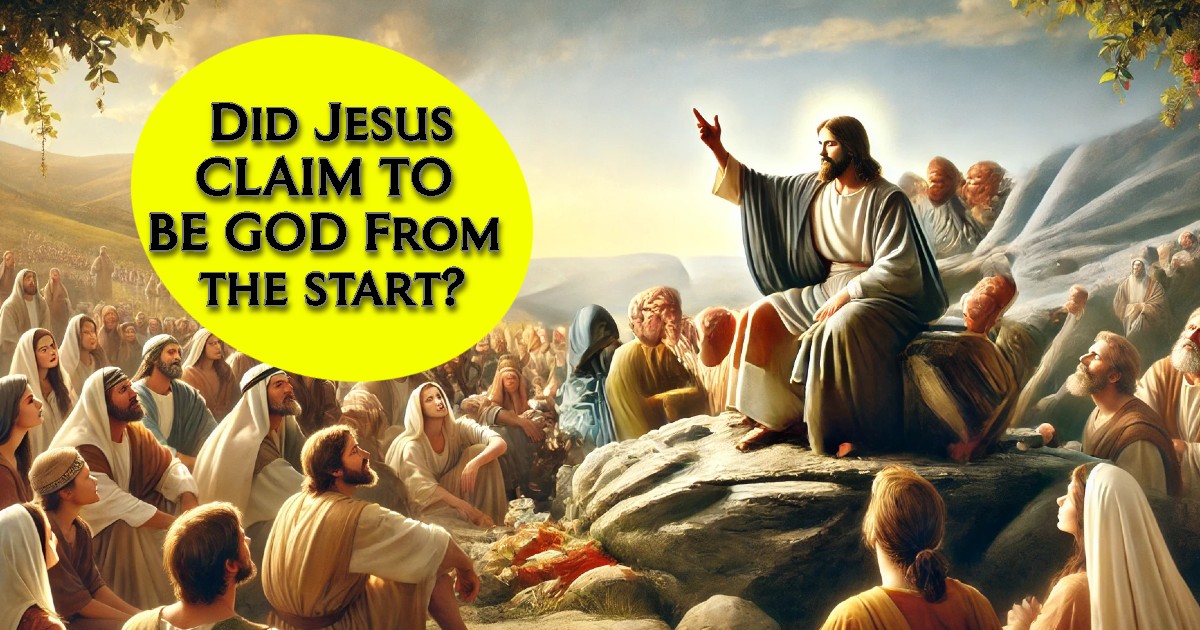For centuries, the divinity of Jesus has been a cornerstone of Christian faith. The belief that Jesus is God incarnate is central to doctrines like the Trinity, shaping theology, worship, and the very identity of Christianity. But did Jesus ever explicitly claim to be God? This question is not only theologically provocative but also historically complex. A secular investigation into the earliest texts—both biblical and extrabiblical—reveals a nuanced picture that may surprise both believers and skeptics alike.
The Synoptic Gospels: A Subtle Christology
The Synoptic Gospels (Matthew, Mark, and Luke) are considered the earliest accounts of Jesus’ life. In these texts, Jesus refers to himself predominantly as the “Son of Man,” a title rooted in Jewish apocalyptic literature, particularly in the Book of Daniel (Daniel 7:13-14). While this title suggests a figure with divine authority, it does not explicitly equate Jesus with God.
For instance, in Mark 10:18, Jesus responds to being called “good teacher” by saying, “Why do you call me good? No one is good except God alone.” This statement appears to create a distinction between himself and God, raising questions about how Jesus viewed his own identity. Secular scholars argue that the absence of direct claims to divinity in these texts may reflect an earlier, more human-centered portrayal of Jesus.
The Gospel of John: A Higher Christology
In stark contrast, the Gospel of John presents a more overtly divine image of Jesus. Verses like John 1:1 (“In the beginning was the Word, and the Word was with God, and the Word was God”) and John 10:30 (“I and the Father are one”) have been pivotal in supporting the doctrine of Jesus’ divinity.
However, secular scholars suggest that John’s Gospel, written later than the Synoptics, reflects a theological development within early Christian communities. The Hellenistic influence on John’s writing, particularly concepts from Greek philosophy like the Logos, indicates an evolution from Jesus as a prophetic figure to a divine entity. This progression suggests that the explicit claims of divinity may not be the historical Jesus’ own words but theological interpretations by his followers.
Paul’s Epistles: The Earliest Christian Writings
Paul’s letters, written even before the Gospels, offer some of the earliest insights into Jesus’ identity. In Philippians 2:6-7, Paul describes Jesus as “being in very nature God, did not consider equality with God something to be used to his own advantage.” This passage, known as the Carmen Christi, is often cited as evidence of early belief in Jesus’ divine status.
Yet, Paul’s language is complex. While he attributes divine qualities to Jesus, he also distinguishes between Jesus and God the Father (1 Corinthians 8:6). Secular analysis suggests that Paul viewed Jesus as a preeminent, exalted figure but stopped short of equating him with the monotheistic God of Israel. This ambiguity reflects the fluidity of early Christological beliefs.
The Influence of Hellenistic and Jewish Thought
Understanding Jesus’ divinity also requires examining the broader cultural and religious context of the ancient Mediterranean world. Jewish monotheism was strict, making the idea of a human being God controversial and blasphemous. However, Hellenistic religions were replete with divine-human hybrids, demigods, and deified emperors.
Secular scholars argue that as Christianity spread into the Greco-Roman world, it absorbed and adapted these concepts. The deification of Jesus could be seen as part of this syncretic process, where Jewish messianic expectations merged with Hellenistic ideas of divine incarnation.
Extrabiblical Texts and Early Christian Writings
Texts like the Gospel of Thomas and other Gnostic writings, which were not included in the canonical New Testament, offer alternative views of Jesus. In these texts, Jesus often speaks in cryptic, philosophical terms, focusing on self-knowledge and enlightenment rather than claiming divine status.
The diversity of early Christian writings indicates that there was no singular, unified view of Jesus’ nature in the first few centuries. Some groups emphasized his humanity, others his divinity, and many held views that defy simple categorization.
Secular investigations suggest that the divinity of Jesus evolved over time, shaped by religious, cultural, and philosophical influences.
Sources:
- “How Jesus Became God” by Bart D. Ehrman
- “The Evolution of the Gospel” by John Shelby Spong
- “The Origins of Christian Morality” by Wayne A. Meeks

